Teaching and living the organic way in the heart of Nebraska
September is not only Organic Month; it’s also Whole Grains Month. The Organic Center is thrilled to recognize The Grain Place Foundation in Nebraska, and its new communications coordinator and rising organic advocate Jane Coghlan.
For more than 6 decades, The Grain Place farm in central Nebraska has shown the way for organic grains production in the “Cornhusker” state and the Midwest and far beyond. Three generations of the Vetter family – dedicated to growing food and raising livestock in an environmentally friendly and sustainable way – have inspired and mentored countless numbers of farmers, agricultural professionals and food industry experts to work towards a healthier food production system.
When Jane Coghlan began her summer internship at The Grain Place farm in 2019, her family predicted the “city girl” from Dallas, Texas, wouldn’t last for more than a week. Then an undergraduate at Arizona State University, Coghlan not only lasted the entire summer but eagerly returned the following summer to work on the farm. Fast forward a few years, and Coghlan is now the newest and youngest member of The Grain Place Foundation board of directors and is Communications Coordinator for the foundation, heading up its communications and social media strategy. 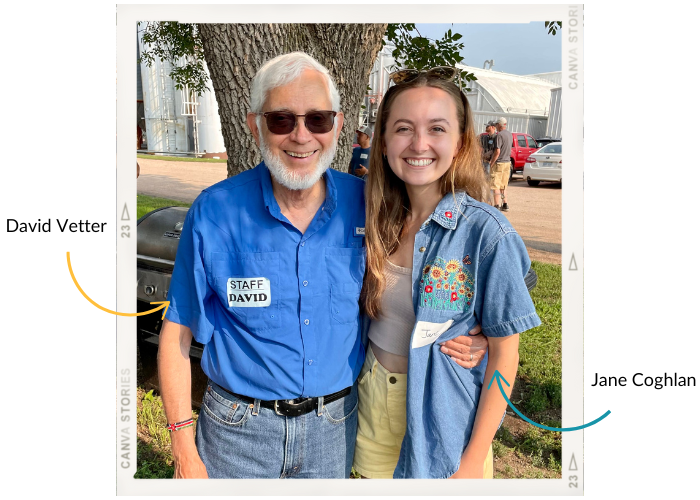
Coghlan attributes her current path to those two impactful summers and the inspiration of David Vetter, the man at the helm of The Grain Place for over thirty years and one of the country’s most eminent organic pioneers.
“Being an intern at the Grain Place Farm was an incredible and life-changing experience for me. At the time, I had no farming knowledge whatsoever, but I was an undergraduate at Arizona State University studying sustainability and was curious about organic farming. David inspired me to study sustainable food systems at ASU and become a changemaker in transforming our food system to become more equitable and environmentally sustainable. The Grain Place continues to inspire me every day,” says Coghlan.
During her summer internships, Coghlan grew from a city kid to an experienced farm hand. She irrigated fields, installed electric fencing, drove tractors and harrowed fields on her own. Over time, she learned a wide range of skills, including animal husbandry, beekeeping, welding and composting. David Vetter took her under his wing and made sure her time on the farm was rich with opportunities, including visiting other farms in the area and attending an agricultural policy meeting with a Federal Trade Commissioner and other D.C. officials.
Coghlan’s focus now is to share the Grain Place’s story with a broader audience, and she says she’s especially excited to “continue building an online presence that reflects the farm’s rich history and David Vetter's deep knowledge.”
The Grain Place’s roots go back to 1953 when the Vetter family purchased the farm that was to become The Grain Place. David Vetter’s father Don, in charge of the family farm, began to question the science and ethics of the emerging use of pesticides and synthetic fertilizers and began to adopt organic farming methods. Vetter grew up working alongside his dad on the farm, but went off to college to earn his Bachelors in agronomy and soil science and a Masters of Divinity. He returned in 1975 and led the farm through the transition to becoming certified organic. For Vetter, organic and sustainable farming methods were the way he integrated his studies of biological and theological principles. 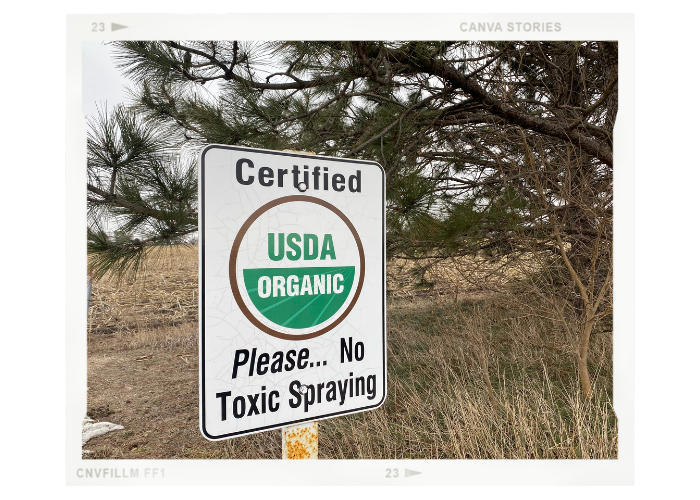
The Grain Place farm has been certified organic since 1978. The farm produces organic heirloom barley, soybeans, corn, popcorn and grass-finished beef in a nine-year rotation. In 1987, the family operation took the next step of establishing Grain Place Foods to process its own grains into value-added products onsite. Today, Grain Place Foods employs more than two dozen people, several of whom have worked there for over 15 years. Grain Place Foods also sources organic grain to supplement what is grown on the Vetter farm because the family business has expanded so much. It purchases organic grains from over 100 organic farm families, including more than four dozen neighboring Nebraskan farms.
The Vetter family established The Grain Place Foundation in 2016 as a way to invest the 280-acre family farm for the common future and with the goal for the private educational and scientific foundation to help spread the family’s vision of a way of farming for the health of the soil and the health of communities. Through the foundation, the family continues to work steadily to help steward other farms into making the transition to organic.
Healthy soil, crop rotation, and lots of bees
Coghlan stresses that it all starts with healthy soil at The Grain Place: “Everything we do starts with building and protecting soil health – that's always our top priority. Through our rotation and organic farming practices, we’ve created soil that’s rich in nutrients and teeming with microbial life. This healthy soil supports strong, resilient plants and a robust ecosystem that can better handle whatever Mother Nature throws at us.” 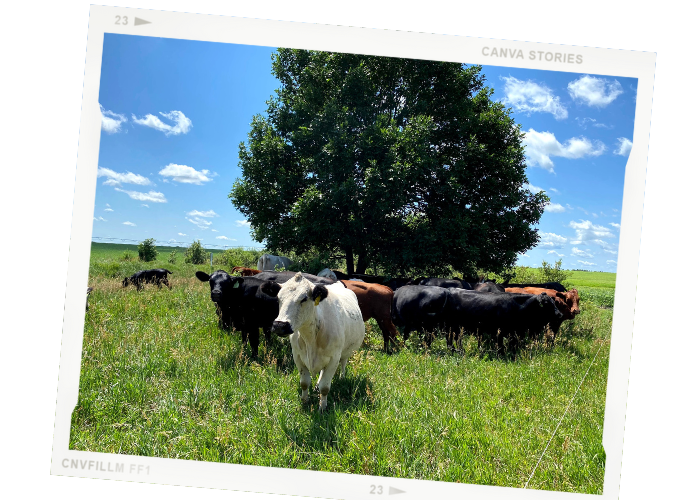
The Grain Place practices a unique 9-year crop rotation to achieve its healthy soil. The farm’s 280 acres host 18 fields, all farmed in the rotation schedule. In addition to its cash crops, the farm plants green cover crops like legumes, alfalfa, red clover and chicory to replenish the soils on the fields that are grazing its cattle. Its rotation includes four years of pasturing to supply the primary nutrients and micro nutrients for plant growth and creating organic matter. Bordering the farm and between fields, rows of trees have been planted to prevent pesticide drift from neighboring farms and enrich the farm’s ecosystem.
“By incorporating a wide variety of crops and pastures, we bring an incredible amount of diversity and life to the farm. It’s a beautiful experience to stand in one of our pastures, surrounded by native plants, and listen to the pollinators buzzing around happily. It’s good for the soul,” says Coghlan.
The farm also maintains an active beekeeping operation. The bees play a crucial role in pollinating many of the crops grown on the farm, contributing to better yields and more robust plants. Healthy pollinator populations help the farm support the biodiversity critical to organic farming, they play a role in seed production and ensure genetic diversity in organic crops, and they help manage pests and diseases naturally. The farm’s bees are an essential topic in its educational outreach about sustainable farming practices and in its campaign to raise awareness about the importance of pollinators. 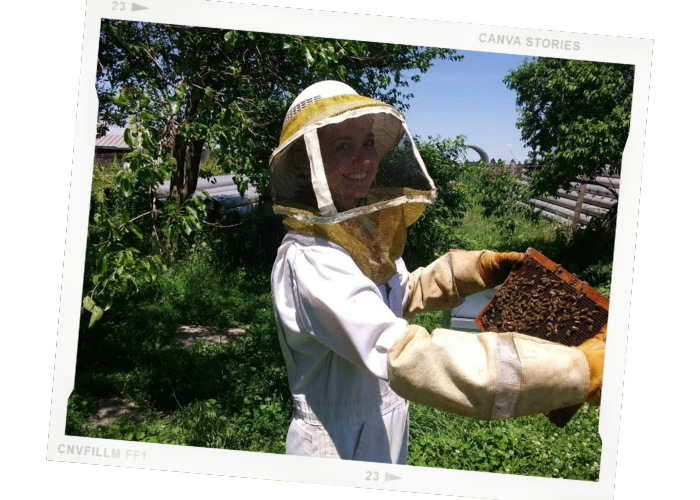
“Maintaining bees on the farm also helps to build a deeper understanding of the interconnectedness of our agricultural practices and natural systems,” says Coghlan. “Bees are a great indicator species – if they’re thriving, it’s often a good sign that the ecosystem on our land is healthy.”
The Grain Place partners in USDA initiative to support farmers transitioning to organic
In 2022, the USDA announced its Organic Transition Initiative (OTI) to expand organic agriculture by providing more direct support and technical assistance to producers across the United States. The $300 million program is the biggest single investment into organic ever made by the department. The program provides locally based farmer training and education in six regions across the U.S., with the Plains regions of the country – Nebraska, Colorada, Kansas, Oklahoma, and North and South Dakota – one of the designated regions.
The Organic Crop Improvement Association (OCIA) is the regional lead for Plains TOPP, and has put together a coalition of organizations providing technical assistance and wrap-around support for transitioning and existing organic farmers. OCIA reached out to The Grain Place Foundation last year to partner with it in its educational and mentoring activities through TOPP, and the results have been more than positive.
“When the TOPP program came along, it felt like a perfect fit,” says Coghlan. “Thanks to TOPP, we’ve been able to expand our efforts even further. We've hosted numerous webinars and informational events, reaching a broader audience of farmers interested in making the transition to organic.”
TOPP-sponsored Grain Place webinars have included an in-depth briefing by Vetter on the process of transitioning to organic farming, one on applying soil health principles in organic row crops with an organic specialist from the University of Nebraska, another on the connection between soil and human health with an ecology expert from Kansas State University, and more. A local farmer gathering was held at The Grain Place to discuss transitioning to organic agriculture. And The Grain Place’s annual field days, a tradition for over 30 years, are now also supported by TOPP to share the ongoing story of the Grain Place. 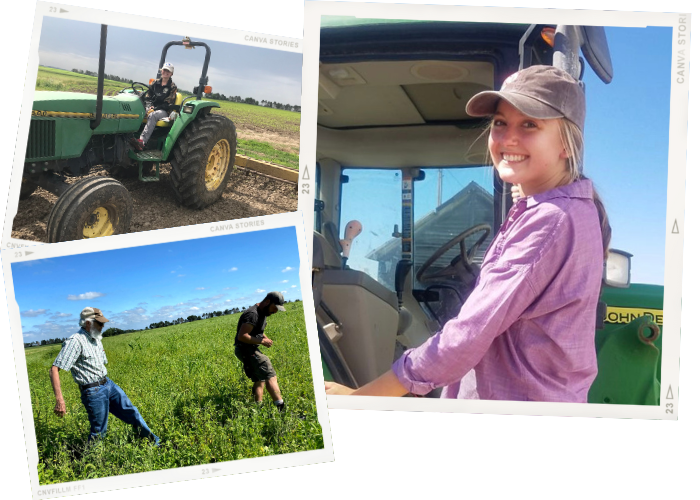
“The support we've gotten through TOPP has not only enabled us to continue our mission but also to strengthen and grow the organic community,” says Coghlan. “We’re seeing more farmers than ever take an interest in organic practices, and TOPP has played a vital role in making that happen. We’re optimistic that this momentum will improve local and regional infrastructure for organic agriculture in the grain belt—a critical need for sustainable growth in our sector.”
Patience, resilience and dedication
While Coghlan is in the early stages of her organic journey, her work and hands-on experience at The Grain Place and the teachings from Vetter and other organic experts at the farm have given her some important insights for farmers considering going organic.
“Farmers interested in the transition to organic grain production need to first understand that this journey is more of a marathon than a sprint. Transitioning to organic is not just about changing your inputs or practices; it’s about adopting a new mindset and commitment to ecological stewardship and soil health,” notes Coghlan.
She encourages farmers to build strong relationships within their local farming community, and to not hesitate to go to other organic producers for advice. She also invites farmers interested in transitioning to organic to take advantage of the resources of The Grain Place Foundation, noting that its field days, workshops, and mentorship opportunities provide practical knowledge and a supportive network. 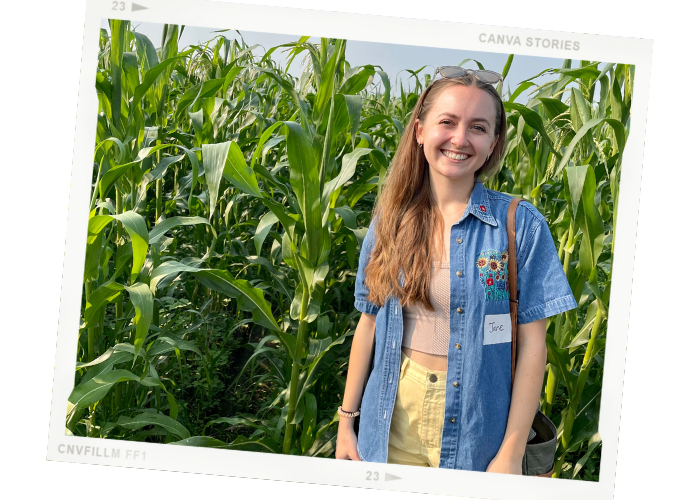
But most importantly, Coghlan urges patience in the road to organic: “Remember that transitioning to organic is not an overnight process; it requires patience, resilience, and dedication. While there may be challenges in the short term, particularly with adjusting to new methods and navigating certification, the long-term benefits—healthier soil, increased biodiversity, and potentially higher premiums for your products—make the effort worthwhile.”
Mentoring, educating, inspiring, building community. Sustainability, environmentally friendly, healthy. All steadfast principles of the organic movement, of The Grain Place, and of venerable visionaries like David Vetter and of rising change makers like Jane Coghlan.


